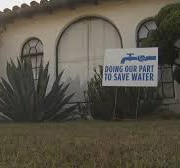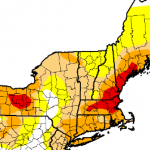A city dying of thirst? Seven costs.
Santa Cruz, CA just mandated a 35% reduction in water usage.
What are the actual effects?
A decade ago, a survey of Santa Cruz residents predicted dire effects from drought caused by long-term warming. Beyond the inconveniences, like reusing water, abandoning lawns, and generally using half the water per person as the rest of the state, there are less-visible financial costs coming to town. Could this happen in your town?
 1. Water rates Yes, residents save money when they save water, but the water authority loses that revenue. So it’s expected to raise rates 7% to 8% each year over the next decade. The city is also considering an additional “drought cost recovery fee.”
1. Water rates Yes, residents save money when they save water, but the water authority loses that revenue. So it’s expected to raise rates 7% to 8% each year over the next decade. The city is also considering an additional “drought cost recovery fee.”
2. Water rate penalties Big fines are added to Santa Cruz water bills if a household uses more than their allotment. A unit of water averages about $3 but can rise to $50 above the allotment. Two water cops write tickets for irrigating during the daytime or hosing down pavement. Offenders go to Water School, similar to traffic school, and can get their first fine waived if they take the two-hour class. There’s a one-month waiting list.
3. Cost of a new water source Santa Cruz is on the ocean, where desalination is an option. The Chamber of Commerce supports building a plant, but so far the city council has bowed to public resistance. Costs running into the millions are projected, most coming from the pockets of county taxpayers.
4. Water quality down The drought hurts water quality. With stream flows as low as 13% of average, pollutants are not diluted or quickly washed away. The county may have to add more water treatment equipment soon, another significant cost to taxpayers.
5. Municipal financing costs up Thanks to growing drought, in 2014 S&P lowered its rating for the local water revenue bonds. The agency pointed to the dwindling revenues from lower water use, and the need for borrowing to cover the construction mentioned above. This raises the interest rate the county will pay to borrow money. S&P said the bonds could be downgraded further if water rates aren’t raised substantially.
6. Business activity in danger Most businesses have been exempt from the rationing, in an effort to boost the economy. But golf courses have been cut back nearly 50 percent, and restrictions could jeopardize beach house rentals to vacationers. Soon water restrictions may be applied to other businesses as well.
7. Real estate values? One might expect rising costs in Santa Cruz to depress home prices. This hasn’t happened yet. For one thing, past water shortages have led to construction moratoriums that contributed to sky-high local real estate prices. For the same reason, property values could be climate-proof for a while.
Santa Cruz has one special defense against adversity – its attitude. I’ll discuss that in a later post.



